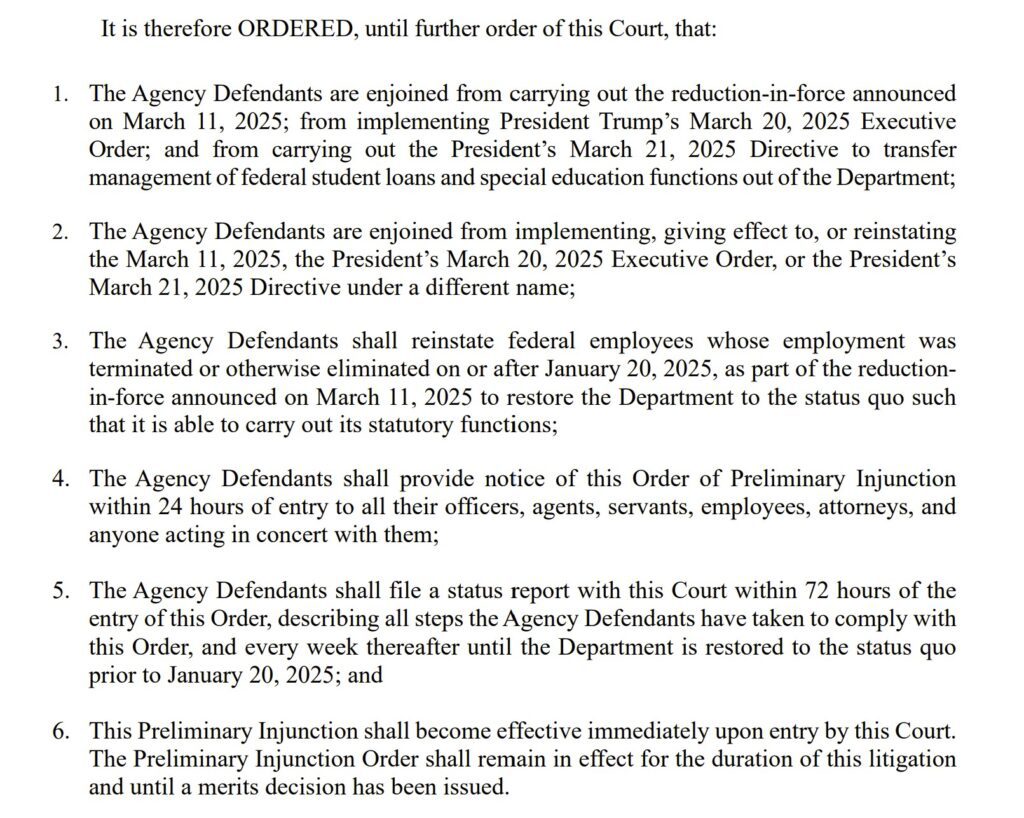A federal district court judge has issued a preliminary injunction that bars the reduction in force (RIF) announced by the U.S. Department of Education, bars implementation of President Donald Trump’s Executive Order closing the department, and bars a transfer of the management of federal student loans and special education functions out of the department.
The court found that the plaintiffs — which includes states, school districts, nonprofits, and labor unions from two cases that were consolidated — “demonstrated that the department will not be able to carry out its statutory functions — and in some cases, is already unable to do so — and defendants have proffered no evidence to the contrary.”
The injunction is warranted, according to the order, “to return the department to the status quo such that it can comply with its statutory obligations.” The ruling was issued by, Myong Joun, a federal district court judge in Massachusetts appointed by former President Joe Biden.
The 88-page order released on May 22 provides a look at what’s at stake in the effort to dismantle the department.
Notice: JavaScript is required for this content.
The impact of the U.S. Department of Education, according to the order
The order says, “For over 150 years, the federal government has played a crucial role in education,” finding that Congress established the department in 1979 “to streamline federal support of education into a single, Cabinet-level department.”
The department has provided both funding and services to school districts and state educational agencies, increasing support for low-income students and students with disabilities, says the order.
The order delineates the scope of the department’s impact, including:
- Distribution of federal funding to schools in all 50 states, finding that in 2020-21 the department distributed $101 billion;
- Serving nearly 18,200 school districts and over 50 million students attending roughly 98,000 public schools and 32,000 private schools;
- Serving more than seven million students with disabilities; and
- Providing services and support to more than 12 million postsecondary students.
The order finds that the department impacts the entire education continuum.
Through the Preschool Development Grant Birth through Five program — a $250 million competitive federal grant — the order says the department “‘supports early childhood education for children from birth through kindergarten.’”
In K-12, the order finds federal funding supports “special education, including paying for assistive technology for students with disabilities; the payment of teacher salaries, and benefits, school counselors, and homeless liaisons; the professional development and salaries for special education teachers, paraprofessionals, and reading specialists; transportation to help children receive the services and programming they need; and physical therapy, speech therapy, and social workers.”
The order says the department “plays a vital role in making higher education more affordable for students across the country” and “manages the federal student loan system by handling loan disbursement, servicing, and borrower assistance.”
The order outlines the laws that define the scope of the work of the department
Laws passed by Congress define the scope of work of the department, including:
The Elementary and Secondary Education Act (ESEA): enacted in 1965 and last reauthorized in 2015 by the Every Student Succeeds Act (ESSA). Title I-A, the largest ESEA program, provides compensatory grants to local education agencies.
The Individuals with Disabilities Education Act (IDEA): enacted in 1975 and last reauthorized in 2004.
Higher Education Act of 1965 (HEA): enacted in 1965 and last comprehensively reauthorized by the Higher Education Opportunity Act of 2008.
Rehabilitation Act of 1973: funds vocational rehabilitation services to assist individuals with disabilities.
Civil Rights Laws: the department is responsible for enforcing various civil rights laws that prohibit discrimination in all programs or activities (unless otherwise specified) receiving federal funds.
Privacy Laws: the department enforces laws protecting student privacy rights, such as the Family Educational Rights and Privacy Act (FERPA).
The order
The order says “the record ‘makes plain that Defendants intend to dismantle the department –and effectively close it — without Congressional authorization,’ and are using a large-scale RIF to do so.” It reviews the authority Secretary Linda McMahon has and doesn’t have.
‘A department without enough employees to perform statutorily mandated functions is not a department at all’
The order says, “A department without enough employees to perform statutorily mandated functions is not a department at all.”
“Before the RIF, the Department of Education had the smallest staff compared to the 15 other cabinet-level executive departments,” finds the order.
After the RIF, the number of employees at the department is estimated to be 1,950 — “roughly a 50% reduction from the department’s 4,133 employees at the beginning of President Trump’s second term.”
From 2022-24, the order says the department’s Office of Civil Rights “received the highest number of complaints in its history, with a record high of 20,687 complaints in 2024.”
“OCR’s staff has been cut in half and seven of its twelve regional offices have been closed,” says the order.
The order outlines harm to the plaintiffs
The order reviews the harm to plaintiffs, including:
- Financial uncertainty and delay: “Absent an injunction, financial delay and uncertainty will irreparably harm Plaintiff States’ SEAs, LEAs, students, and even payroll. … Significantly, the School Districts have demonstrated that they lack sufficient financial resources to weather delays in funding.”
- Cuts to vital research, data, accreditation, and compliance services.
- Essential services provided by the Office of Federal Student Aid: “The RIF has resulted in the practical elimination of most, if not all, essential offices within the FSA.”
- Essential services provided by the Office of Civil Rights.
The preliminary injunction orders the following:

A federal district court judge in the District of Columbia earlier this week denied a preliminary injunction related to the RIF for the Office of Civil Rights.
